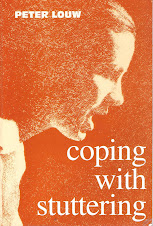You may want to read Dr Martin Schwartz's 1991 book which is free and online, Stutter No More, here. It is IMHO probably the best book ever written on stuttering and provides details of how the vocal-cord "lock" results in stuttering, and how this lock can be managed.
And for his latest (2015) book, The Thiamin Protocol, which is also free and can be downloaded as a PDF, visit THIS SITE. In this concise book, only 87 pages long, he details his findings that a daily intake of thiamin (another word for vitamin B1) and magnesium, together with a pro-thiamin diet, can reduce stuttering in about 1/3 of people who stutter. These supplements may have a calming effect, so reducing stress; or else may address a neurotransmitter deficiency. Chapter 5, The Trigger For Stuttering, details his general stuttering theory and is a tour de force.
For a fuller picture of Schwartz's thinking you may also want to read his earlier books - some copies are still available via Amazon:
Stuttering Solved - this is his first and very controversial book. In some ways outdated, but still contains many important insights.
You Can Stop Stuttering (co-written by Dr Grady Carter, a medical doctor who stutters and was helped much by the Passive Airflow approach)
Dr Schwartz's views on stuttering are hugely important for all who stutter. The speech therapy establishment has made a terrible error in opposing and marginalising him. That's one reason why stuttering therapy is, generally speaking, still in the labyrinth of seeking-and-never-finding.
Dr Schwartz is now retired and no longer presents workshops, but you can follow his free self-help online programme, consisting of three videos, a workbook and a manual. It will be found HERE. I attended some of his workshops in the 1980s and they changed my life, even though his approach is not a miracle cure and requires much practising.
And for his latest (2015) book, The Thiamin Protocol, which is also free and can be downloaded as a PDF, visit THIS SITE. In this concise book, only 87 pages long, he details his findings that a daily intake of thiamin (another word for vitamin B1) and magnesium, together with a pro-thiamin diet, can reduce stuttering in about 1/3 of people who stutter. These supplements may have a calming effect, so reducing stress; or else may address a neurotransmitter deficiency. Chapter 5, The Trigger For Stuttering, details his general stuttering theory and is a tour de force.
For a fuller picture of Schwartz's thinking you may also want to read his earlier books - some copies are still available via Amazon:
Stuttering Solved - this is his first and very controversial book. In some ways outdated, but still contains many important insights.
You Can Stop Stuttering (co-written by Dr Grady Carter, a medical doctor who stutters and was helped much by the Passive Airflow approach)
Dr Schwartz's views on stuttering are hugely important for all who stutter. The speech therapy establishment has made a terrible error in opposing and marginalising him. That's one reason why stuttering therapy is, generally speaking, still in the labyrinth of seeking-and-never-finding.
Dr Schwartz is now retired and no longer presents workshops, but you can follow his free self-help online programme, consisting of three videos, a workbook and a manual. It will be found HERE. I attended some of his workshops in the 1980s and they changed my life, even though his approach is not a miracle cure and requires much practising.






Hey Peter, it Chata (alan) again. I am reading your book. I have read many books on stuttering but your book is by far the most useful. Really, without doubt you are great man and you write in excellent way. I will try to use your advice and try to speak with passive airflow, aince it kind of make sense to me now. After considering all the therapies, i do think that at the end vocal cords are the main reason for stuttering. Best wishes from Bosnia. Alan
ReplyDeleteDear Alan
ReplyDeleteMany thanks for your kind and encouraging words! I am glad that you find the book helpful. When I read Dr Martin Schwartz's book 'Stuttering Solved' many years ago it made a lot of sense to me and it still does. After 30 years of focusing on the vocal cords I am more than ever convinced that he has pinpointed the cause of stuttering. Even so the passive airflow technique is not a miracle cure and should be combined with stress management etc. But at least it is a point of departure. If we as PWSs can find consensus on the cause of stuttering, we can better focus on ways to manage and perhaps even cure stuttering. However in the area of stuttering it is very difficult to convince people. It is so difficult to prove any particular theory of stuttering. What we really need is a speech researcher who follows in Dr Schwartz's footsteps, to take his work further, to provide further proof and do more research on the vocal cords. I think there is a huge opportunity here for young, bright researchers, for someone who can think for him/herself and not be afraid to follow an unpopular line of thought. Best wishes for you in Bosnia, you too are doing wonderful work! You, too, are a pioneer. Kind regards, Peter
Years ago, I used to stutter. I blocked on certain consonants and letter combinations, and found it difficult and frustrating to speak to almost any person except for my closest relatives. This problem was eating into every aspect of my life, and one day I decided to challenhge it instead of submitting to the seemingly unavoidable.
ReplyDelete